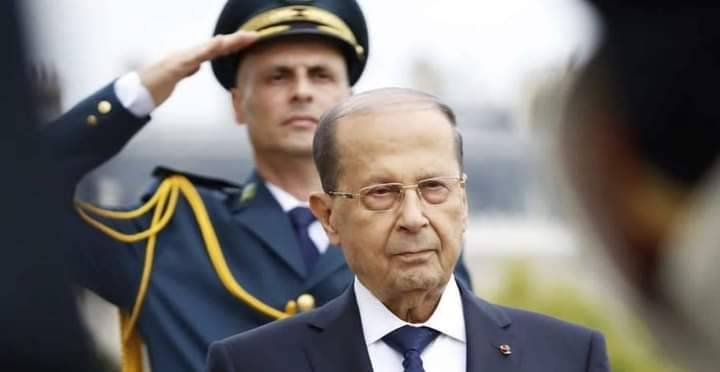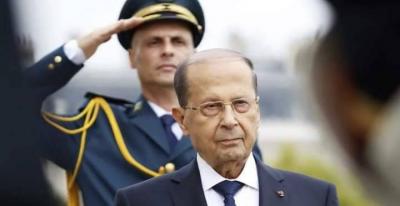As the end of the term approaches day by day, the responses of the President of the Republic become more succinct and sometimes insufficient or unsatisfactory. There are numerous questions and doubts attributed to his fear of what is being planned for the next phase after he leaves the Baabda Palace. The one thing President Michel Aoun can confirm with certainty is that he will leave the Baabda Palace on the last day of his term. However, what he cannot confirm—almost everything surrounding the presidential entitlement—is vast. This includes the significance of the president's statement: "I hope that on the night of October 31, everything will be normal so that I can return home with peace of mind."
When asked if he has doubts, he replies, "Of course, I have doubts." When further asked about the questions surrounding the presidential elections, he identifies three main issues: the formation of the government or the continuation of the caretaker government, the election of a new president or entering a vacuum "from which no one knows when or how we will exit," and how to reach October 31 "the longest and most difficult day."
Aoun does not limit his anxiety to his doubts but also to the potential consequences:
1. He does not mind the caretaker government remaining, "but I prefer adding six political ministers to it. We are not sure how long it will last with the vacuum they are promising us. Without agreement on the new government, we will not reach any result. But the basis of the agreement is balance, and that has not happened until now. I told the American envoy Amos Hochstein: you want to extract oil and you want security; we want to extract oil and want security and above that, the economy. To achieve what each of us wants, we must agree. This is what I also tell Prime Minister Najib Mikati. Unfortunately, our meetings lack candor. The declared discourse is not true, which is why the problem persists. I am always ready to agree with him - if he wants - based on common criteria between us for government formation. He does not form it alone because he knows what the constitution says about my signature and its importance and necessity, and I cannot impose conditions on him because he will also sign the decree for formation. When I do not agree with the designated prime minister, I am no longer bothered if I do not meet him."
He adds: "I have never infringed on the powers of the executive authority or the powers of the prime minister. The entire matter is that they do not want a president who governs. I applied the constitution and laws in accordance with what I swore to do. Article 50 of the constitution, which obligates the elected president to take the oath, mandates the commitment to enforce the laws alongside the constitution without separating them. That is what I did. The executive and legislative authorities are the ones who have grown accustomed to the powers of the presidency."
2. The caretaker government "cannot assume the powers of the presidency. For that to happen would not only violate the constitution but also expose us to a real national crisis which is prone to ignition. Reaching this day means that those who caused the problem must bear full responsibility. I remain steadfast in this viewpoint, insisting on a government that meets constitutional specifications, and I encourage the designated prime minister to agree on one capable of shouldering the burdens that await it and how much time we will wait to exit from it. Its continuation in its current capacity - which many are promoting - means that we face a conspiracy. I fear there may be some preparing for the last day of my term, October 31, a conspiracy resembling a coup against the system, the state, the presidency, and the constitution, starting from the caretaker government or any other reason. I also fear it is intended to change the regime. If I pause, I will be accused of abandoning my constitutional responsibilities."
Aoun adds: "The obstruction of government formation and the preemptive claim of a vacuum are indicators warning us of this conspiracy. I will not say what I will do. My known decision is to leave the presidency at the end of the term. But be careful. The threads of the conspiracy have already begun, and it is worse if it continues beyond the constitutional deadline and the vacancy. Even my concern for security is not to be discounted. The indicators are domestic, but they are also external. Some external parties may want to reach this stage; otherwise, how can one explain the continuation of financial blockade against us and the continued closing of doors in our face? I raise more than one question regarding the ongoing boycott of us by some Arab countries despite our fulfillment of our commitments towards them, and the alleviation of misunderstandings without any improvement in our relations with them, as if they do not want it. Months have passed, and we are still under the boycott. Is there something hidden from us?"
3. When asked about the significance of his confirmation of returning to Rabieh at the end of the term while simultaneously shrouding it in ambiguity about what might happen on the last day, the president prefers not to delve into details and "wait for the hour in its time." However, he adds: "I have said repeatedly that I will leave the Baabda Palace on the last day. I will add now that I will leave the palace if it is a normal day where no one harbors ill intentions. If I sense a conspiracy arising, I will not stand idle. True, I did not assume the presidency from behind, but I hope to hand it over to whoever will succeed me, whom they are searching for now, and I hope they succeed so that I can bless and entrust the responsibility to them. I will strive with all my might to ensure that we elect a president before the end of the constitutional deadline. As for the occurrence of a vacancy, I certainly am not the one to cause it and will not be held responsible for it. The apparent responsibility lies with the Parliament. But the actual responsibility lies with those who stand behind the obstruction of the meeting of the council."
Finally, he says: "In Rabieh, I will not be a spectator. I have my political and popular influence, yet I leave to the Free Patriotic Movement, which is a bloc of 21 deputies, to undertake the role it is assigned in the presidential election and the choice it desires. It is the one concerned with the entitlement, and I trust it."




